Channelling, then transforming heavy societal demons by way of an aggressive and spontaneous art and music practice, Jill Flanagan creates those uncomfortable and unique works that require the audience to experience opprobrious time-based nether regions. Recently, The COMP Magazine visited Flanagan’s west Pilsen studio to discuss growing up in Chicago’s Lincoln Square neighborhood, the intersection of her art and music, how her transgender identity has influenced her aesthetic practice, making music with Gula Gila, and what is slated for the rest of the summer.
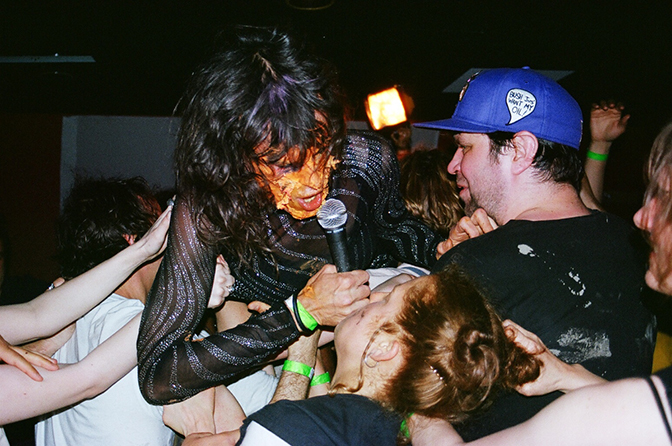
You grew up here in Chicago? I believe Lincoln Square? How did you engage the city as a youth? Are there any early experiences that you see that inform your current aesthetic and sonic explorations?
As a callow youth, I discovered dadaism and punk, two things that continue to inspire my art today. Punk allowed an attitude of diving into creating. You could barely learn even the rudiments of music theory and start playing in a band, plunking away at an out of tune bass. Why wait? This anger and lack of patience fit into my personality when I was young. And while I was still in the process of realizing that I was transgender, I believe that punk especially let me begin to step out of traditional male expression.
Lincoln Square was then a decaying german neighborhood dying out into the artisanal bubble of dog-walkers and baby strollers of today. Me and my friends were mostly straight edge weirdos who thought of ourselves as punks but were pretty out of touch with the punk scene. We would play music in my basement and wander around the streets, hanging out in laundromats. We also would spend a lot of time in grimy diners eating cheese omelets, drinking milkshakes and drinking way too much coffee. A lot of philosophical and musical arguments that would get really heated. We really loved Le Sabre, a barely lit 24 hour diner with a bunch of fishtanks with large sucker fish in them. I loved the old chicago that is sadly disappeared, a bleak working-class city in the midwest.
Dada repurposed waste and the unintentional into aesthetic statements. It also had a good dose of nihilism that fit in well with the banal environment we loved. We did a lot of street performances as a collective called the Idiot movement where we would yell nonsense at people in the loop. A few actions I remember: protesting a Marilyn Manson book signing because he was a square, doing a “Free the Art” protest on the steps of the Art Institute of Chicago and going to city hall and challenging Mayor Daly to a duel. There was also one where we made a pinata shaped like a blimp that said “Capitalism” and we got a frustrated office worker to destroy it.
Noise music was a huge inspiration as well. The turning point was when I first heard Flipper. When I got “Generic” for my birthday, the overwhelming negativity and absurdly slow tempos inspired me to lie on the tiled floor of my basement, washing myself in sound. Then I gradually got into The Boredoms, Teenage Jesus and the Jerks and local bands The Flying Luttenbachers and The Scissor Girls. These bands showed me the ways that punk was stagnating by allowing genre to dictate what was acceptable. Punk was also about unlearning musical skills and going back to more inchoate forms of sound but noise went further than punk in moving outside of acceptable musical expression.
This was lead to my playing in Coughs. I had in my twenties become interested in feminism although I had difficulty explaining it’s appeal to me as a male identified person. I started to see that female expression was one of the things repressed or ignored by rock music. Rock music’s technicality had barred women from being participants. Women have always been oppressed and a big part of that was not allowing them to create their own culture. I began to involve women in my musical projects and seek kinship with them. Eventually I realized I had repressed my own femininity and that needed to be expressed by coming out as transgender.
I guess although I feel like the art I make now engages more with my everyday struggles and is more effectively political because of it. I’ve kept a lot of the same aesthetic of using trash and the things and places discarded by society to mount a critique or tell something about it. But, what I think I’ve learned as well is the ways avant-garde art is in itself an escape from our social privilege and that needs to be accounted for as well. Noise and our brand of dadaism ended up being blind to their own ideological straightjackets and pointing those out are seems a fruitful site to make future art.
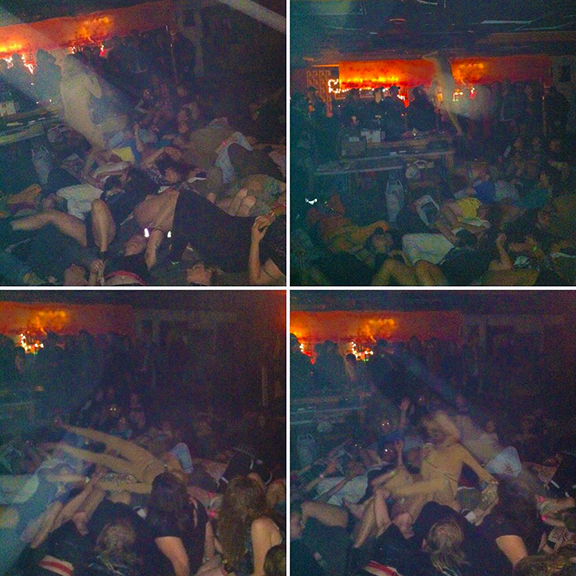
I see an untethered primal method in your approach to making art and music. It is very physical, and at times creates varied spheres of tension. Do you see any differences in your approach to producing art or music? Or do you just consider the various mediums as a means for presenting a specific voice?
Performance is a way to present my music in a way that is challenging to the spectator. Tension is very important to me as a performer as a way to entertain (which I think is important), but by putting people more on their guard they’re perhaps more likely to think “Why are we all standing around watching this?” There is a decision and a responsibility as to why we are all putting ourselves through this and not rebelling.
I can’t really escape my voice in the art that I make. I am an angry person and in my personal life I try to deal with it with a lot of humor. But in music, I am released from politeness and courtesy and let rage, fear and despair out which results in a lot of intensity. I’m trying to move away from anger as my default mode of artistic expression, but it’s hard because I have so many opportunities to be pissed off as a transgender woman.
A lot of people are surprised at the amount of hatred and bad feelings I am exposed to being transgender. At the same time, I’m a lot more insulated than people of color who are trans. For instance, most of the time when I am harassed I’m not actually in fear for my life, although that has happened to me at times.
Nevertheless, I still get exposed to a ton of infuriating shit and sometimes I’m still surprised that it’s still a thing in this supposedly more enlightened age. The anger I have to repress is fuel for great instances in acting out. The performance arena is wonderful because you can be totally unacceptable and get away with it where a non-performer you might get your ass kicked.
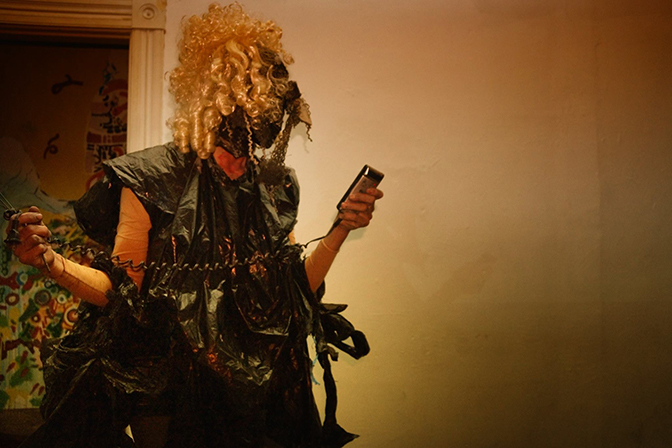
2015 appears to have been a productive year. You released the banjo led psychedelic punk album “Bearing the Brunt” with Gula Gila (Stephany Colunga and Janice Lim). And, as Forced Into Femininity produced the experimental opera Erase Your Grave. Can you share with us how you approach the production of these two fairly unconnected works simultaneously?
These were very different processes. Gula Gila is more collaborative and a lot of times more free in expression than forced. My main objective there is to try to back up my bandmates playing to create a churning layer underneath the music.
When we started the band I had very little interest in psychedelia outside of using actual psychedelics, but I was interested in helping Stephany create the kind of music she wanted to do. I found from the first time we jammed that me and Stephany have great musical chemistry and I love her singing style. And we really got lucky when we asked Janice to play with us, she is one of the best drummers I have ever worked with. We write our songs by improvising until something sticks and then editing what we come up with into coherent parts.
Forced into Femininity also works from a process of improvisation as well but the end result is rigidly structured. I’ll noodle around imputing keyboard parts and drum machine and bass playing into Audacity (a free open source sound program). This will be combined with a lot of cut and pasting, double tracking, sampling, speeding things up or slowing them down. I’m also constantly writing lyrics and so I’ll sort of shoehorn lyrics into parts that they fit. But once the lyrics are fit to the songs, it has to be very precise because the music is the always the same so it is a very rigid performance except for the moments between the songs which are usually improvised.
“Erase your grave” was not really an opera although parts of the vocal stylings were definitely operatic, or mock operatic. It was more of an album. The approach on the album was to kind of create a dense and fucked sound, a very maximalist and fast aesthetic that I’ve since moved away from a little because when you multitrack and multitrack, it becomes kind of a giant mud puddle of sound and it’s very difficult for it to sound good on album or performing live. I ended up mixing the album myself which was a frustrating learning experience, mostly what I learned was not to do that. My newest ep “I’m Making progress” was recorded by Dan Agosto who did a great job and took the stress out of the process. Also, on the album I was trying to do a lot of horrific stories as lyrics and using dense layers of metaphors to screen what I was actually talking about. I might be moving back in that direction, but I’ve found it interesting recently to just talk about things in a very literal political way.
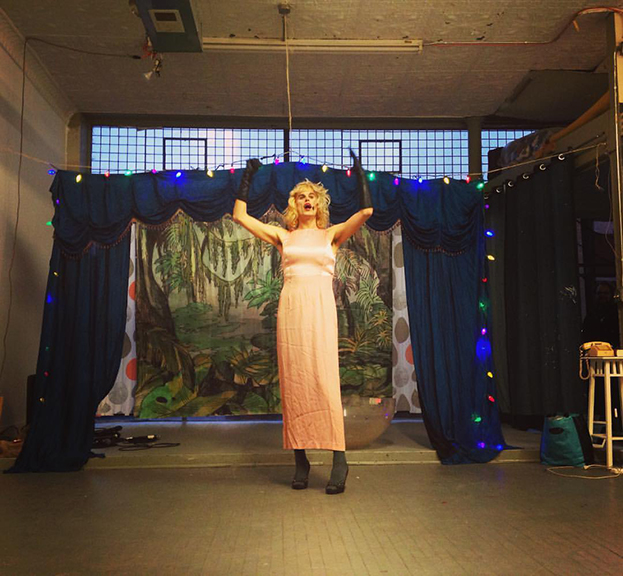
I’m fascinated with the performance “a danger to myself and others” that you did at Rubikon. What was the impetus for this piece? Can you walk us through your process?
There were a lot of different influences for that piece. One was being really fascinated by watching Elvis videos from the early 70’s when he was a little stoned, but not the total mess that he became later. This fit into an idea of the similarity of rock stars and psychotics. Both make their way in the world transgressing and causing destruction and both are often totally disconnected from reality, but the rock star is beloved and the psychotic is punished and cut off from society.
Another inspiration was the Eugene Ionesco play “The Lesson” which I was obsessed with as a high school dadaist. In the play, in a private lesson between teacher and pupil, the teacher’s vocalizations get louder and louder and more and more impenetrably verbose while at same time, the student more and more loses the power of speech. As the play progresses the teachers speech increasingly wounds the student, who begins to cry out in wordless torment before collapsing in a state of catatonia.
The performance began with me dragging a suitcase containing my collaborator Maireadiation Kiwi and a bunch of plastic plants and dirt. The idea was to approach the performance like a rock star so I needed an understudy and assistant and Mairead played that role. After dumping them out on the ground I awoke them and while I danced to Elvis’s opening theme music (“Thus spake zarathrusta” seguing with a double bass kick into a wonderfully cheezy vamp) they ran around the audience getting people to applaud.
There was a rock star style monologue about paying my dues by all the basements and rock clubs I had to play “In little towns like Dayton, Ohio. Indianapolis, etc.” But as I continued the experiences I was talking about starting to sound more and more degrading and my vocal style became more and more hysterical and violent until Mairead began to crumble on the floor and cry out assaulted by my overly obnoxious tones.
The other influence and kind of going with the overall theme was that I had a kind of gaslighty roommate at the time who had gone on a huge tear on me over the phone ending by telling me that I was a danger to myself and everyone around me. So I had to use it in the title and in the end Mairead as my beleaguered understudy rebelled against me and pushed me into the same suitcase I had carried them into declaring that I had made a huge mess and made the title declaration. Kind of the final connection where the rock star becomes the psychotic.
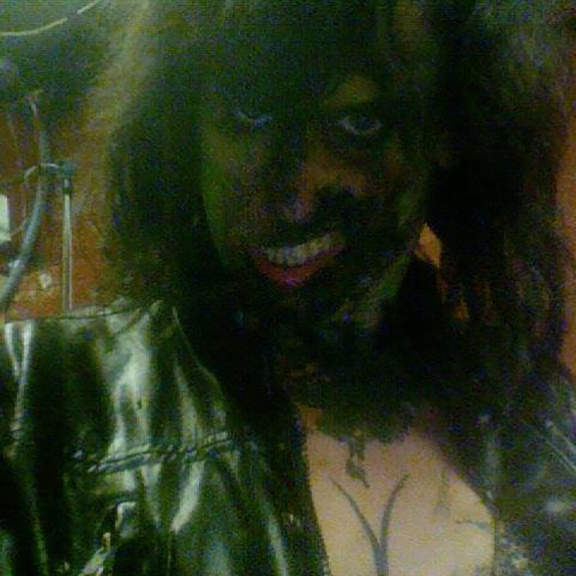
Sister Vanity’s Steep Decline is a wonderful title and curious sonic sculpture that you produced for the Audio/Visual show at the Learning Center in Bridgeport. Can you tell us what prompted this work? And, please share your intent?
There wasn’t a sonic element to the piece. The way I work with visual art tends to be a lot more process based. I realized from the three visual pieces I’ve made, how difficult it is to make something that gives off a definite feeling. When you make things as part of a performance you have the strength of your performance or your music to give it that feeling. I’m not sure I’m there yet with my purely visual work.
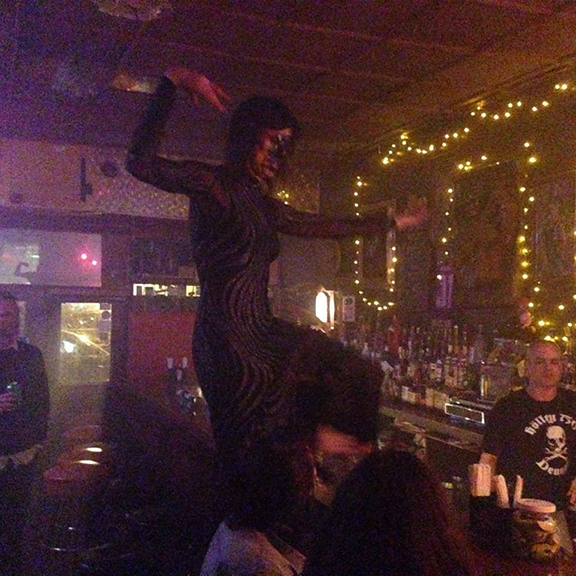
What do you value most in your aesthetic practice?
The freedom to improvise which is something I’m working on integrating more into my daily life. And also, the ability to express my emotions which I’m trying to do more.
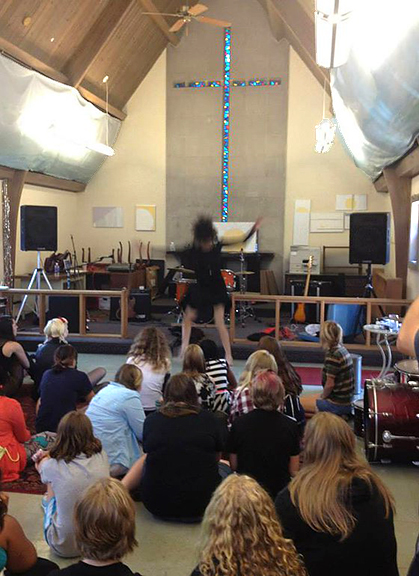
What are you currently working upon? Do you have any performances coming up later this summer or in the fall?
I’m performing July 13th at the Archer Ballroom for a show around the theme of Eternal Return. Gula Gila is playing with CCR Headcleaner at Club Rectum. And I’m doing a mini-tour of the midwest with madcap performance weirdo Lorene Boboushian.
There’s a new EP coming out called “I’m making progress” which is in an entirely different style than erase your grave. I’ve been obsessing a lot over my own privilege and I thought an album where the artist called out their own privilege and awfulness as a global citizen hadn’t really been done before. I decided it was more interesting to just do really literal and simplistic political lyrics but kind of from the opposite perspective of most political punk. Rather than the outsider railing against the establishment, I tried to speak from the position of privilege which I occupy as a white person from a middle class background and explore the narcissistic dodges and avoidance and useless guilt of that position. It should be out on Decoherence Records this fall.
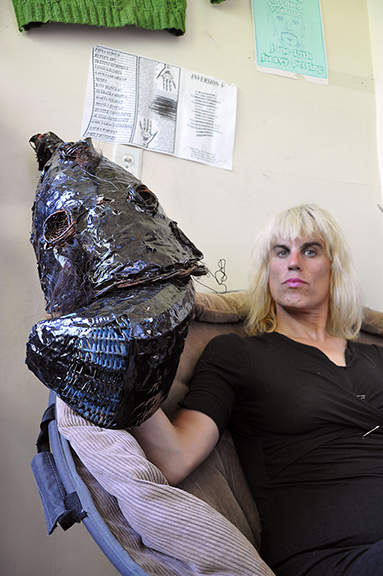
Jill Flanagan, artist and musician, Chicago, IL, 2016
For additional information on the art and music of Jill Flanagan, please visit:
Jill Flanagan – http://jailflanagan1.wix.com/forcedintofemininity
Forced Into Femininity – https://forcedintofemininity.bandcamp.com/
Gula Gila – https://gulagila.bandcamp.com/album/bearing-the-brunt-3
Artist interview and portrait of artist by Chester Alamo-Costello


